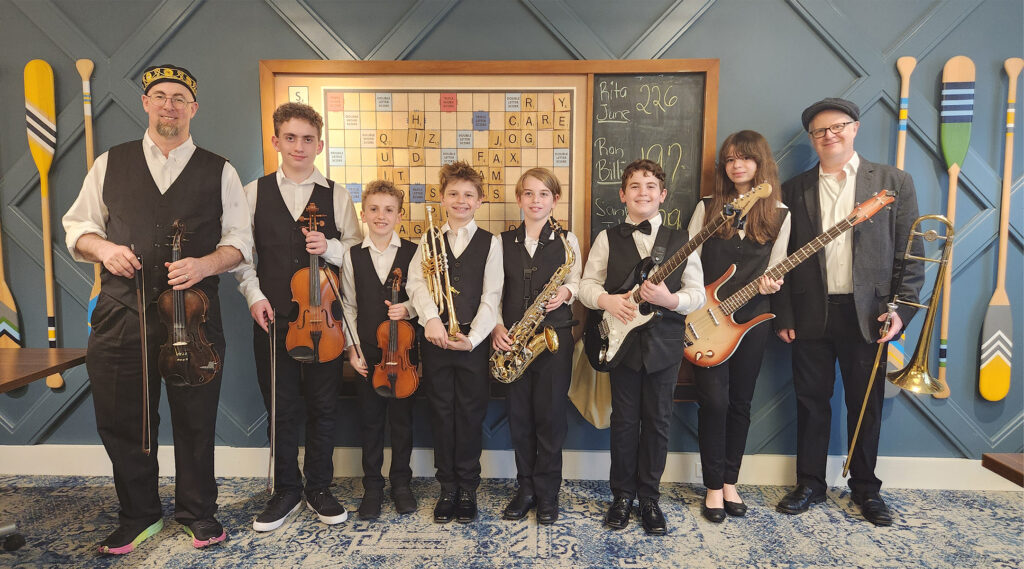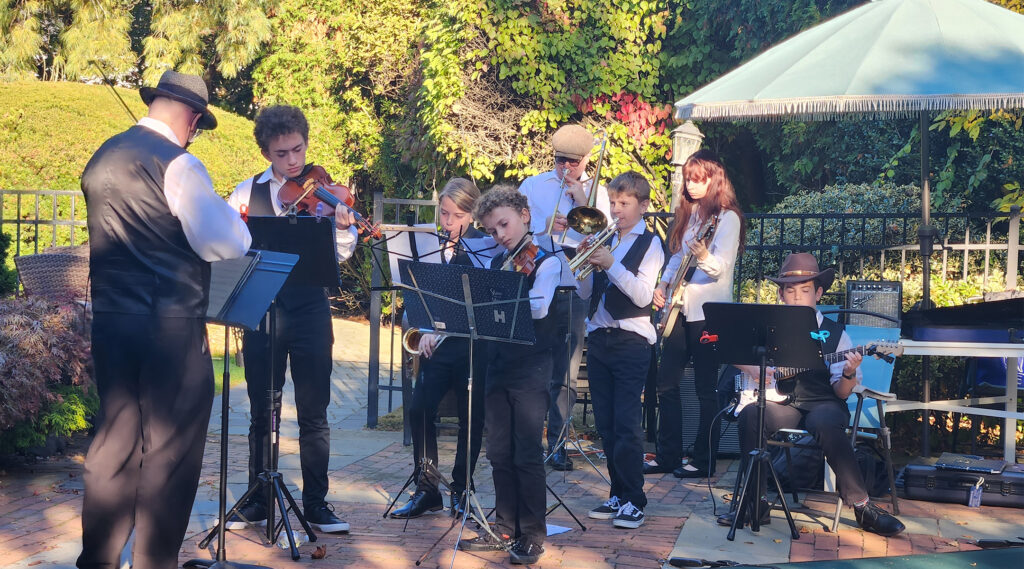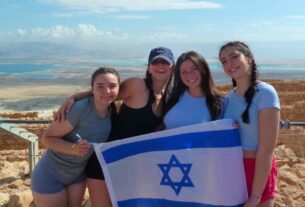At the Orchard Estate assisted living facility in Woodbury, New York, residents hum along to the klezmer music familiar to many Jews of their generation. The Yiddish-inflected music with roots in Eastern Europe is old school, but the band is not: Its six members range in age from 10 to 16.
The young musicians are members of the Klezmaniacs, a new, local ensemble. This youth klezmer band, founded in January 2023 at the MakomNY synagogue in Bethpage, New York, is one of at least three klezmer youth ensembles that have sprung up around the country in recent years.
These ensembles are connecting Jewish youth with their roots and, according to Christina Crowder, executive director of the Klezmer Institute, providing an “injection of folks who come” to the klezmer scene with “a fair amount of musical training already and who are also engaging with this music early in their careers.”
“I find that to be very promising,” Crowder said of the growth of youth klezmer and its impact. “It really bodes well for the future.”
Leo Clark, 15, who plays viola in the band, is a founding member of the Klezmaniacs, whose members come from three different Jewish families.
“It’s one thing just to hear music from your heritage. It’s just one thing to hear the songs at Chanukah or at High Holidays, but actually playing them or being a part of it is just something totally different and it’s very meaningful,” said Clark.
“Being in the band helped me realize that there are different ways to connect with my Jewish identity — not just going to services or Hebrew school,” said Leo Clark’s brother, Harry, 12, who plays violin in the band and is also a founding member.
It’s a win-win for bass guitarist Leah Hasselbring, 16. “I chose to join so I could connect with my culture while also improving at my instrument,” she said.
The ensemble performs at Friday night services, celebrations of the Jewish holiday Simchat Torah, at local assisted living facilities, and at the Golden Festival, an Eastern European and Balkan music festival, in Astoria, Queens in New York. On Dec. 20, the band will play during a musical Shabbat at the synagogue.
“We just got a piece for Simchat Torah and that’s different than just playing just any piece of classical music we play in orchestra for school,” said Clark. “While I do love that,” he added, klezmer is “way more significant, has more meaning to it for me.”
Klezmer, whose roots in Yiddish-speaking lands go back to the 16th century, was brought to America by Jewish immigrants in the late 19th and early 20th centuries. There are several instrumental techniques, including some meant to mimic the voice of a cantor, that are unique to klezmer. According to Alicia Svigals, the best known active klezmer violinist, klezmer went out of fashion in the U.S. “starting around the 1960s,” when it was “supplanted by Israeli folk dance music and new Israeli music.”
“It was starting to be considered old-fashioned, and Yiddish was no longer in fashion, it was Grandma and Grandpa’s language” said Svigals, adding that klezmer faded from the scene because of “a combination of Zionism and assimilation.” Musicians like Andy Statman and the Klezmer Conservatory Band began reviving klezmer in the late 1970s and early 1980s. Svigals began playing klezmer “five to 10 years” later, rediscovering traditional klezmer violin techniques by listening to old recordings of klezmer fiddlers and adding her own flourishes, creating her own style. She became a founding member of the Grammy-winning Klezmatics, the most popular of the revival bands.
“It’s been wonderful and surprising to see that people really took an interest in” klezmer, Svigals said. “When I started, it was this oddball thing to do.” Now, she said, there are young musicians who have grown up playing and hearing klezmer.
Left: Brothers Harry (left) and Leo Clark (right). Right: Professional klezmer drummer and teacher Aaron Alexander (right) instructs the Klezmaniacs. (Courtesy Audra Lewton)
Five years ago, Crowder says, there were two prominent klezmer festivals in North America, Yiddish New York and KlezKanada, both of which allow children and teens to register, as well as another festival, Klezmerquerque, which she says mainly draws local visitors.
Now she counts at least seven festivals, one still being organized. Many of those festivals are explicitly family-friendly. KlezCummington, founded in 2021, offered a day of programming for children, as well as a crafts table throughout the festival. KlezKolorado, inaugurated in 2024, also encourages families to attend. Both Klezmer on Ice, in Minneapolis, and Phoenix Klezmer and Yiddish Dance Festival welcome all ages.
“The difference between five years ago and today is that people are — at least young folks are — like, ‘hey, I really love klezmer and I want to teach and I want to share and I want to do something in my local community’ and they have the gumption to make it happen,” Crowder says. To her, that’s “super exciting.”
Among the musicians bringing klezmer to their local communities is Howard Ungar, founder of the DC Klezmer Workshop. Ungar started out playing klezmer 26 years ago, when, inspired by a friend, he attended KlezKamp, now Yiddish New York, with his children. He was inspired by Aaron Alexander’s New York Klezmer Series, as well as an episode of Radiant Others, a klezmer podcast, featuring the clarinetist Michael Winograd, who advocated that the klezmer community shouldn’t just rely on retreats and festivals, but on local Jewish communities. His oldest child, Beila, 31, is now a klezmer musician and the producer of “Radiant Others.”
From the beginning, Ungar made a conscious effort to recruit students, advertising the workshop at a local music school. He said that youth participation has been mixed. “We’ve had some teenagers come and hang out with us a bit, but they usually have moved on pretty quickly,” he said. Recently, a senior in high school played at the workshop, but he has since graduated.
The Klezmaniacs of MakomNY, which Audra Lewton, Clark’s mother, described as a “very musical Jewish community,” is one of the youth groups immersing Jewish children in klezmer. “I was thinking about ways that we might even further expand that and involve the kids and the teens,” said Lewton on founding the Klezmaniacs. “I thought it might be fun to explore a different genre of music for the kids,” many of whom play classical music in school.
“The idea of tying in a klezmer band for kids and teens just seemed really cool and different, something that’s not really happening, at least around here, anywhere else,” she said.
Lewton recruited Aaron Alexander, a professional klezmer drummer and teacher who coaches several youth and intergenerational klezmer bands across New York, including a group at the Workers’ Circle, to work with the klezmaniacs.
“I’m treating it kind of just like having a band,” Alexander said. “I’m trying to teach them a little bit about klezmer and Yiddish music history.” Because the group is based in a synagogue, “we’re also doing klezmer-adjacent tunes, some liturgical things.”

Aaron Alexander (far left) and Curtis Hasselbring (far right), the father of two of the musicians, with the members of the Klezmaniacs. (Courtesy Audra Lewton)
Klezmer, unlike most classical music, is improvisational, so Alexander is teaching his students to ornament melodies and play their own interpretations of the music. In the future, Alexander hopes to unite the different youth klezmer ensembles throughout New York into “an all-city klezmer band,” although that “requires more administrative persistence than” he’s been able to muster.
“Aaron is a great teacher and always keeps us on our toes,” wrote violinist Harry Clark in an email. “He is teaching us what it’s like to work together as a band.” Clark also appreciates klezmer musically. “I like playing klezmer music because it’s a different way to express our creativity. We really have to listen to each other but we also have freedom to do what we think sounds good.”
When Nathan Hasselbring, 11, of Syosset, New York, heard about the group at Hebrew school, he thought, “I’m definitely going to do that.” Playing trumpet for the Klezmaniacs has “been a wonderful experience just playing with the different people there, [in] a style of music that I’d never played before until it started up,” Hasselbring said. “Before, I’d play classical and jazz. I still play them, I just added klezmer to it.” Hasselbring, who aspires to be a professional musician, added that learning a new style of music was a step for him on that path.
Although Hasselbring’s sister Leah, the bass guitarist, joined the band later, she had known about klezmer for a long time. The siblings’ father, Curtis Hasselbring, a trombonist and guitarist on the faculty at Long Island University, also plays klezmer. He now performs with the Klezmaniacs as well.
“I was very aware of klezmer previously and had been exposed to it my whole life. It’s part of what my dad does for a living,” she wrote in an email. “Klezmer itself I think sounds very beautiful, and also provides a really nice environment.” While playing it hasn’t changed how Hasselbring thinks about her Jewish identity, it’s allowed her “to further embrace it.”
One experience that stood out for both Hasselbrings and Harry Clark was the ensemble’s performance at the Golden Festival last May, where the Klezmaniacs joined forces with another of Alexander’s youth bands. They played popular songs like “Vesamachta beChagecha” (“You shall rejoice in your festivals”), which violist Leo Clark called the band’s theme song, in a ballroom where festival-goers danced along to their music.
“Klezmer has been really fun,” Clark said. “We constantly get new music and it’s always fun to just play with friends; the community there is also really great. I’ve had a lot of fun with some of the other bandmates.”
Support the Jewish Telegraphic Agency
Help ensure Jewish news remains accessible to all. Your donation to the Jewish Telegraphic Agency powers the trusted journalism that has connected Jewish communities worldwide for more than 100 years. With your help, (JR) can continue to deliver vital news and insights. Donate today.




